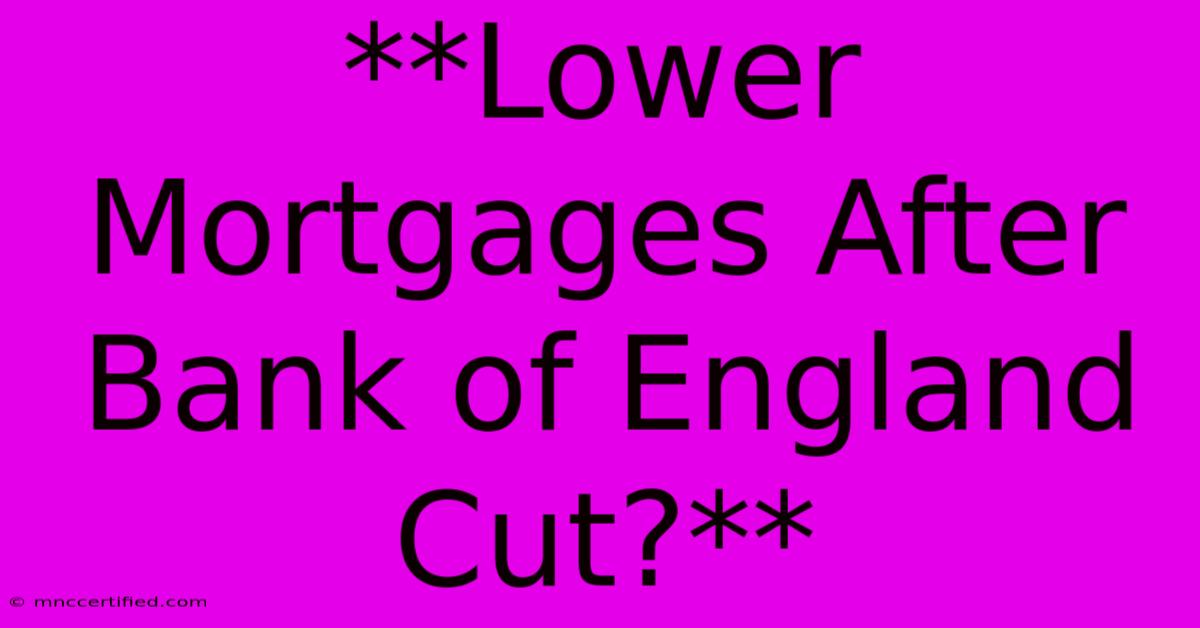**Lower Mortgages After Bank Of England Cut?**

Table of Contents
Lower Mortgages After Bank of England Cut? Exploring the Possibilities
The Bank of England (BoE) recently announced a cut in interest rates, a move that has sparked hope among homeowners and prospective buyers alike. The question on everyone's mind is: Will this lead to lower mortgage rates?
While the connection between BoE interest rates and mortgage rates is complex, understanding the dynamics can shed light on potential scenarios. Here's a breakdown of the factors at play and what you can expect.
The Bank of England's Role in Interest Rates
The BoE acts as the central bank, setting the base rate, which influences the cost of borrowing for banks and other financial institutions. When the base rate drops, it becomes cheaper for lenders to borrow money, potentially leading to lower mortgage rates. However, it's not a direct, one-to-one relationship.
Factors Influencing Mortgage Rates Beyond the Base Rate
Several other factors influence mortgage rates beyond the BoE's base rate. These include:
- Inflation: High inflation can drive up borrowing costs, prompting lenders to raise mortgage rates to offset potential losses.
- Economic Growth: Strong economic growth generally leads to higher demand for mortgages, potentially pushing rates up. Conversely, weak economic conditions can cause rates to decline.
- Lender Competition: Competitive pressures among lenders can lead to variations in mortgage rates. Some lenders may offer more attractive rates to attract borrowers, while others might maintain higher rates to maintain profit margins.
- Risk Appetite: Lenders' risk appetite can also impact rates. If they perceive higher risks associated with lending, they may increase rates to compensate.
Recent Trends and Potential Outcomes
While the BoE's rate cut is a positive signal, it's important to remember that it's not a guarantee of lower mortgage rates. Several factors will influence the outcome, including the factors listed above.
- Current Economic Climate: The UK economy is facing challenges, including high inflation and slowing growth. These factors could lead to lenders exercising caution and maintaining higher rates despite the BoE's cut.
- Market Expectations: Market expectations regarding future inflation and economic growth will also play a role. If markets anticipate further rate cuts or a more favorable economic outlook, this could support lower mortgage rates.
- Lender Decisions: Ultimately, individual lenders will determine their own mortgage rates based on their assessment of risks, market conditions, and competitive pressures.
What to Do Now
If you're considering buying a home or refinancing your mortgage, staying informed about market developments and lender offerings is crucial.
- Monitor Interest Rate Trends: Keep track of the BoE's base rate and how it influences mortgage rates offered by different lenders.
- Compare Mortgage Rates: Regularly compare rates from different lenders to find the best deals available.
- Consult with a Financial Advisor: Seek professional advice from a qualified financial advisor to navigate the mortgage market and make informed decisions.
Conclusion
The BoE's recent rate cut is a positive development that could potentially lead to lower mortgage rates. However, it's important to understand that the relationship is complex and subject to various influencing factors. By staying informed, comparing rates, and seeking professional advice, you can make informed decisions about your mortgage in the current market.

Thank you for visiting our website wich cover about **Lower Mortgages After Bank Of England Cut?**. We hope the information provided has been useful to you. Feel free to contact us if you have any questions or need further assistance. See you next time and dont miss to bookmark.
Featured Posts
-
Fc Noah Vs Chelsea Conference League Live Score
Nov 08, 2024
-
Starbucks Unveils Holiday Menu And Festive Cups
Nov 08, 2024
-
Watch Chelsea Vs Noah Conference League Guide
Nov 08, 2024
-
Germany Stable Government Collapses
Nov 08, 2024
-
Bad Faith Insurance Attorney Los Angeles
Nov 08, 2024